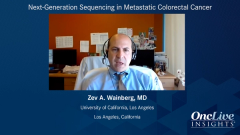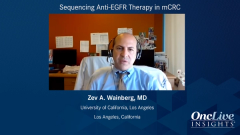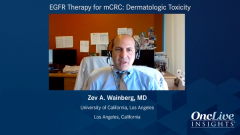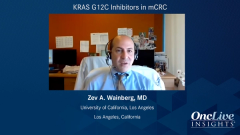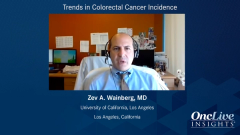
Supplements and Featured Publications
- My Treatment Approach: Colorectal Cancer
- Volume 1
- Issue 1
Future Directions in mCRC
Drs Jaffer A. Ajani and Zev A. Wainberg comment on current obstacles surrounding the treatment of metastatic colorectal cancer and consider the future use of ctDNA as more is learned about the disease.
Episodes in this series

Zev A. Wainberg, MD: Jaffer, for the last few minutes, is there anything new? You know all about what’s going on in gastric cancer, but how about in colon cancer? Anything you can think about that’s worked in gastric cancer that may have a future in colorectal cancer, whether it’s immunotherapy drugs or something along those lines?
Jaffer Ajani, MD: It’s a real challenge after third line, or even at third line, if the patients are not doing well. Of course, we must find novel targets and then develop drugs that have reasonable safety. Moving forward, this may apply to multiple tumor types—all these oncogenes that cancer cells use, they’re also manipulating their environment. There are a few exceptions. For an MSI [microsatellite instability]–high tumor, the oncogenes cannot manipulate the stroma because there are too many new antigens, and the immune system is alerted to all that. But if you think about run-of-the-mill colon cancer, which is a cold type in which the whole stroma is orchestrated by the oncogenes. We’ll have to not only treat the cancer cell with a targeted agent but also treat the stroma at the same time. If you just manipulate the immune system, the cancer reprograms. If you just go after the tumor cell, then also you don’t win because tumor cells are much too smart; 1 clone you can eliminate or reduce but the other will emerge. I wanted to ask you on the review article that rich gold bargain you wrote, there are some interesting hypotheses there about the KRAS. I didn’t know that the KRAS status can change based on liquid biopsy. Tissue-based studies may not be all that reliable. Can you talk about that a little? Why would a KRAS-mutant clone subside if you give like a treatment-free interval?
Zev A. Wainberg, MD: That’s interesting. It’s a controversial thing to be sure because some studies have shown that it changes in 1 direction or it changes in the other direction. As you know, this may just be a product of clonal heterogeneity more than anything. It may not be that the tumor is losing its RAS status or gaining its RAS status as much as a different clone. I do agree with you that ctDNA [circulating tumor DNA] has allowed us to study this more comprehensively. There’s a nice study being done, a very prospectively designed study called the CRICKET study, looking at this question of rechallenge with an EGFR inhibitor. Historically, we never rechallenge with an EGFR inhibitor; when they progress, they progress. But in these patients, in whom they had RAS wild type, some of these patients on ctDNA did convert somehow to become mutated.
The question is, when you combine an EGFR inhibitor with something else, will it work? There’s a new study that suggested that 1 of the elements of that is a MET, which has been around for a while, of course—MET amplification as a resistance mechanism to EGFR inhibitors. There’s a nice new study starting in patients with progression on EGFR inhibitors who lose their RAS status or mutate and become MET amplified in the studies combining the MET inhibitor with an EGFR inhibitor. There are different prospective studies being done to look exactly at that question, which are easy to do nowadays. Now you don’t have to do serial biopsies. You can just rely on circulating tumor DNA to both make the assessment of where the mutation is as a resistance mechanism and also to follow prospectively. We’ve developed enough retrospective experience with circulating tumor DNA that we should start putting some of these assays to the test in prospective studies. So that 1 is interesting as well.
Transcript Edited for Clarity
Articles in this issue
over 4 years ago
Anti-EGFR/Chemo Combos Allow for Tailored Approach in mCRCover 4 years ago
Biweekly Cetuximab Offers a Convenient Dosing Option in mCRCover 4 years ago
Genomics, Sidedness Guide Treatment Selection in Metastatic CRCover 4 years ago
KRAS G12C Inhibitors in mCRCover 4 years ago
EGFR Therapy for mCRC: Dermatologic Toxicityover 4 years ago
Later-Line Treatment Options for mCRCover 4 years ago
Sequencing Anti-EGFR Therapy in mCRCover 4 years ago
Changes in Cetuximab Dosing Schedule in mCRCover 4 years ago
Selecting Systemic Therapy for Newly Diagnosed mCRC


